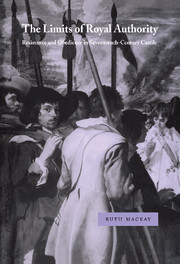1 - Recruitment and royal authority
Published online by Cambridge University Press: 29 September 2009
Summary
The tests to which obedience was put in seventeenth-century Castile, the nuances and ambiguities, not to say manipulation, to which it was subjected, reflected not only popular and local attitudes toward royal power but also, of course, the nature of the power itself. The ways in which orders were formulated, the bodies that issued them and the strictures conditioning royal orders all must be taken into account in order to understand the subsequent response to orders. In short, how was the country governed? Such a discussion is, essentially, about the nature of the Castilian state.
The decentralized nature of the Spanish monarchy was clearly a source of structural weakness; maintaining authority over the Iberian Peninsula and much of Europe and the Americas in an equitable and efficient way was virtually impossible. Efforts, notably by the Count-Duke of Olivares, to attain a higher degree of integration, control, and obedience were ultimately unsuccessful. Indeed, the Castilian state's resistance to being reshaped to meet its imperial tasks is quite remarkable. The fragmentation was not only geographic, linguistic, and cultural; it was also jurisdictional. Just as Spain was traversed by internal frontiers marking seigneurial, customs, and regional boundaries, whose limits were often uncertain, the map also shows a mesh of conflicting administrations — military, fiscal, judicial, ecclesiastic, seigneurial, and municipal. In addition, some formerly royal functions, such as tax-collecting, had moved into private hands, the result of the dispensation of favors by kings burdened with debts or obliged to buy loyalty, making a definition of the public function even more difficult. With authority so widespread, effective orders and obedience were clearly problematic.
- Type
- Chapter
- Information
- The Limits of Royal AuthorityResistance and Obedience in Seventeenth-Century Castile, pp. 21 - 60Publisher: Cambridge University PressPrint publication year: 1999



